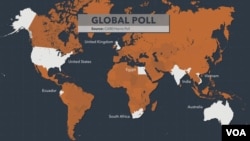After a year that saw the #MeToo movement sweep America, sexual harassment remains a global problem.
Nearly 1 in 4 men across eight countries believe they are owed sex from their employees and that it’s sometimes OK to expect a worker to have intimate interactions with the boss’s family member or friend.
That's according to the results of a poll commissioned by CARE, the antipoverty nonprofit, that suggests there’s still much work to be done 12 months into the so-called #MeToo era.
“It ranged up as high as 62 percent in Egypt, which is shocking to think that 62 percent of bosses think that they deserve sex from their employees,” says Rachael Leman, senior director of U.S. advocacy for CARE. “But even in the U.S., the number was certainly lower. But we’re talking about 1 in 8 men who have that attitude as well in 2018. So, it points to again that this really is a global issue.”
The catalyst
It was one year ago last October that The New York Times and The New Yorker magazine broke the Pulitzer Prize-winning story detailing Hollywood mogul Harvey Weinstein's alleged sexual harassment and abuse of several women who worked for him.
A powerful producer of award-winning films, Weinstein allegedly promised to help advance the women’s careers in exchange for sexual favors. Actresses Mira Sorvino and Ashley Judd were allegedly blacklisted for not succumbing to Weinstein’s demands.
Weinstein now faces rape and sexual assault charges.
Since the publication of the Weinstein stories, a chorus of women from all walks of life has told their stories of harassment and assault — a movement that’s become known for its Twitter hashtag, MeToo.
One year after bursting into the public consciousness, #MeToo appears to be having an impact on American society — socially, politically and in the corporate world.
In the boardroom
Davia Temin, a psychologist by training, heads a reputation, crisis and culture consulting firm in New York City.
She says her clients include some of the biggest companies in the world. Temin finds that investors now hesitate before putting money into businesses with unresolved #MeToo situations.
“There’s no more being able to hide behind the wink-wink, nod-nod, boys will be boys, ‘Oh, he’s a high performer, don’t get him,’” Temin says. “Now that the system and social media are not allowing that to happen, and women are joining their voices together, then I think you have a moment when it all comes together. That tipping point’s been hit. We’ve gone beyond it.”
Since December 2015, Temin’s company has kept track of high-profile executives — including government officials, media entertainment celebrities, teachers, professors and sports figures — accused of sexual harassment, or worse. To date, there are more than 723 names on that list.
Temin says corporations are now more concerned about cleaning up toxic workplace cultures.
“I actually think corporate boards are becoming more and more responsible,” she said. “One part of it is because they’ve got more women on them. One part of it is because they’re aware of reputational risk. And one part is that you’ve got newer members of boards, more diverse boards, and that diversity brings with it a power of making sure we’re trying to do the right thing.”
On the campaign trail
#MeToo could also be helping to fuel the surge in female candidates running for political office.
Women nominees are running in record numbers for U.S. Congress, state governorships and state legislatures in the midterm elections.
“I think that #MeToo creates and sort of adds to an environment in which we’re questioning the imbalance of power, particularly between men and women,” says Kelly Dittmar, assistant professor of political science at Rutgers University, and a scholar at the Center for American Women in Politics at Rutgers.
“And if you focus and highlight that imbalance of power in all of our institutions, what you start to see is that women aren’t at these tables, women aren’t in positions of power making important decisions."
Even if the female candidates don’t prevail on Election Day, Dittmar says they’ve already made a difference by changing the conversation and the image of what a candidate looks like, opening the door for women who want to run for political office in the future.
Lasting #MeToo moment?
Teresa Barndt, a stay-at-home mother from Utah, is among Americans who say #MeToo has influenced her outlook.
"It definitely impacts how I want to teach my daughter to react to certain situations," she says.
The movement has also made some men more aware of sexual harassment in the workplace, although there is concern that #MeToo might be going too far.
"I think a lot of people kind of think it’s a little bit too much, which has been voiced by our president before, but I think it’s absolutely a step in the right direction," says Eric Vincent, a web developer from Arizona.
His father, Tom, agrees. "I think it’s both beneficial and not beneficial. I think it’s a good start and what’s going to happen is I think that over time it’ll be more rational and it would be a good thing to have happened."
Temin believes the movement toward gender parity and freedom from harassment in the workplace is here to stay.
“At some point, you have to put a line in the sand that says it stops here, and it stops now. And I think we’re there,” she says. “I think we’re there through social media. I think we’re there through diversity. I think we’re there through the power of more women’s leadership. And women leaders are actually voicing their priorities more clearly than ever before.”
Still, the CARE poll suggests there's a long way to go to before women are free — not only from #MeToo moments — but also to speak up against them.
"Absolutely, I think every woman has a moment,” said Hiba Cheetany, a pharmacist from Illinois. “Did I react the way I wanted to? No, I didn't, because I was afraid to. And do I think that I would react the same now? I definitely probably would, because I'm still afraid. There's still a backlash."





